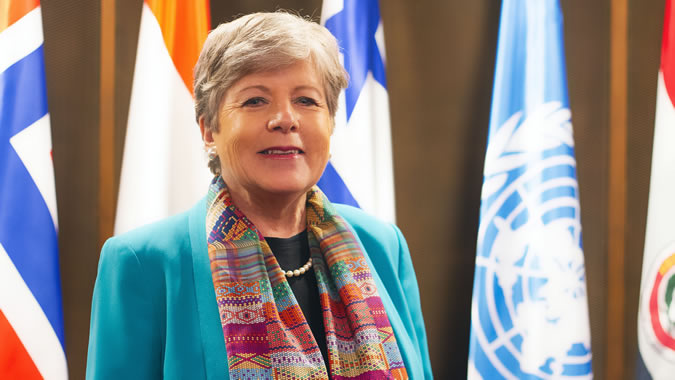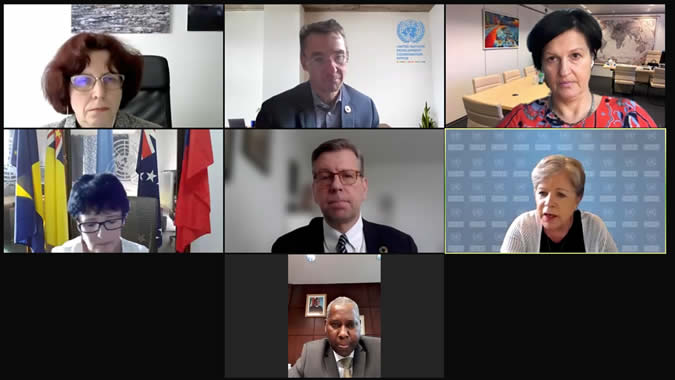ECLAC Asks for Reconsidering the Criteria to Measure and Classify Development, and Suspending the “Graduations” of Middle-Income Countries During the Pandemic
The regional organization’s Executive Secretary, Alicia Bárcena, participated in a debate on the second day of the 20th session of the United Nations High-level Committee on South-South Cooperation.

The region of Latin America and the Caribbean is basically made up of middle-income countries that, in the context of financing for development, have been left out of access to concessional funds, especially Caribbean island states and small, Central American economies. That is why it is urgently necessary to reconsider the criteria for measuring and classifying development while also suspending the “graduations” of middle-income countries during the pandemic, Alicia Bárcena, Executive Secretary of the Economic Commission for Latin America and the Caribbean (ECLAC), proposed during the 20th session of the High-level Committee on South-South Cooperation (June 1-4).
Bárcena was one of the panelists in the thematic discussion entitled Accelerating the achievement of the SDGs through effective implementation of the BAPA+40 outcome document while responding to the COVID-19 pandemic and similar global crises.
“We need to have an index of multidimensional vulnerability for middle-income countries. ‘Graduation’ from Official Development Assistance (ODA) cannot be tantamount to exclusion and winding up in limbo in terms of cooperation. This is about contributing to a different way of addressing international cooperation, among peers, more horizontally. South-South cooperation teaches us important lessons in this sense,” ECLAC’s highest authority explained.
“We are also seeking to be incorporated into initiatives such as the debt service suspension initiative or to participate in a more multilateral committee on taxes worldwide,” said Bárcena, recalling that ECLAC, the European Commission, the Development Centre of the Organisation for Economic Co-operation and Development (OECD), and other partners, have created the concept of “Development in Transition,” which questions the use of per capita GDP as the sole criterion for graduating countries. “We consider development to be a gradual process, not a linear one. We should talk about gradations, not graduation, because these indicators should include countries’ capacity to save, access to capital markets, investment, and fiscal progressivity,” she expressed.
According to Bárcena, today more than ever, Latin America and the Caribbean has demonstrated its historic commitment to South-South and triangular cooperation, with innovative, solidarity-based criteria. ECLAC, she highlighted, has had a Committee on South-South Cooperation since 1981.
Latin America and the Caribbean should strengthen its regional agreements and collaboration mechanisms, and build a vigorous and concerted voice in the world, she sustained.
“More than ever before, we need regional initiatives to deepen the generation and exchange of capacities, knowledge, experiences and good practices, and to create common spaces for action to optimize the response to COVID-19. Our region has a great deal to offer: we have a solid network of cooperation agencies that have given impetus to South-South and triangular cooperation initiatives,” she stated.
Latin America and the Caribbean is the developing region of the world that has been most affected by COVID-19, with 8.4% of the global population and 30% of all deaths. It is also the most highly indebted region and has the largest external debt service as a proportion of exports of goods and services (more than 54%).
Meanwhile, achievement of the Sustainable Development Goals (SDGs) has shown marked heterogeneity in the region: only 32% of targets have been achieved to date or are on track to be achieved by 2030 if trends continue, Bárcena warned.
During her presentation, the Executive Secretary explained that ECLAC’s proposal for a transformative recovery urges countries to eradicate poverty and move towards equality; build authentic competitiveness; promote environmental sustainability; revitalize the process of regional integration; and further the eLAC-Digital Agenda for Latin America and the Caribbean platform, among other measures.
Finally, Bárcena indicated that the COVID-19 crisis has revealed the enormous asymmetries between developed and developing countries: “Unequal access to vaccines is a sad example of how much progress is needed on cooperation to collectively achieve the provision of global public goods.” She concluded by saying, “we call for rethinking development and cooperation, and for building a new social and political compact, with new coalitions and institutions.”
The discussion began with the opening remarks of María del Carmen Squeff, Permanent Representative of Argentina to the United Nations and President of the High-level Committee on South-South Cooperation, and continued with presentations by Dr. A. K. Abdul Momen, Foreign Minister of the People’s Republic of Bangladesh; Mantas Adomenas, Vice Minister of Foreign Affairs of the Republic of Lithuania; Estherine Fotabong, Director of Programme Implementation and Coordination at AUDA-NEPAD; Tedros Adhanom Ghebreyesus, Director-General of the World Health Organization (by video); and Elizabeth Sidiropoulos, Chief Executive of The South African Institute of International Affairs. Pamela Coke-Hamilton, Executive Director of the International Trade Centre, served as the moderator.
The High-level Committee on South-South Cooperation is a subsidiary body of the United Nations General Assembly that meets every two years to review progress and provide policy guidance that helps strengthen international support for such cooperation. The session this year is the first that the Committee has held since the Second High-level United Nations Conference on South-South Cooperation (BAPA+40), which took place in 2019 in Buenos Aires, Argentina.
Related content

South-South and Triangular Cooperation Should Support the Forging of a Better and More Egalitarian Multilateralism, Especially in Times of COVID-19: Alicia Bárcena
ECLAC’s Executive Secretary participated in a side event to the 20th session of the United Nations High-level Committee on South-South Cooperation.
Country(ies)
- Latin America and the Caribbean
Contact
Public Information Unit
- prensa@cepal.org
- (56 2) 2210 2040
